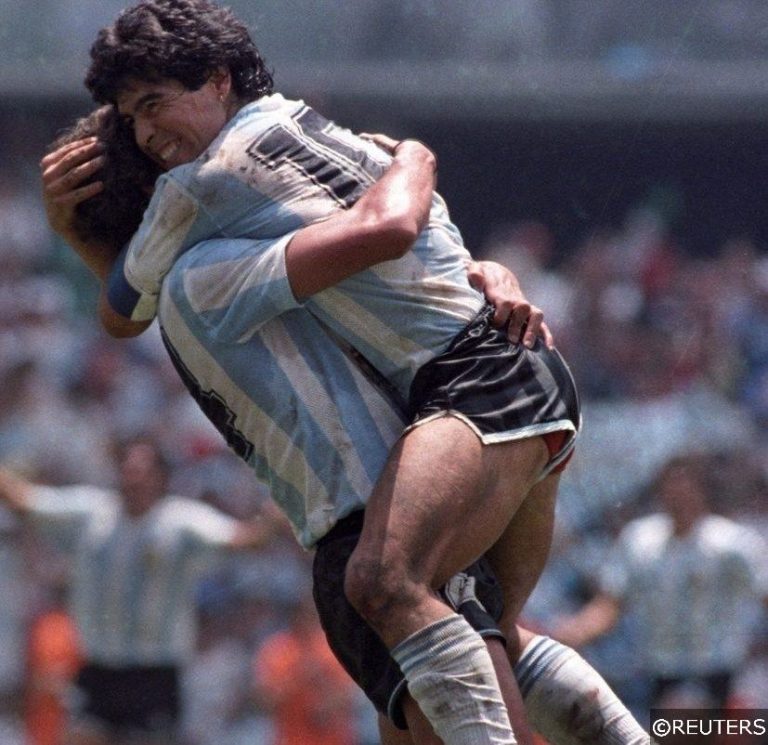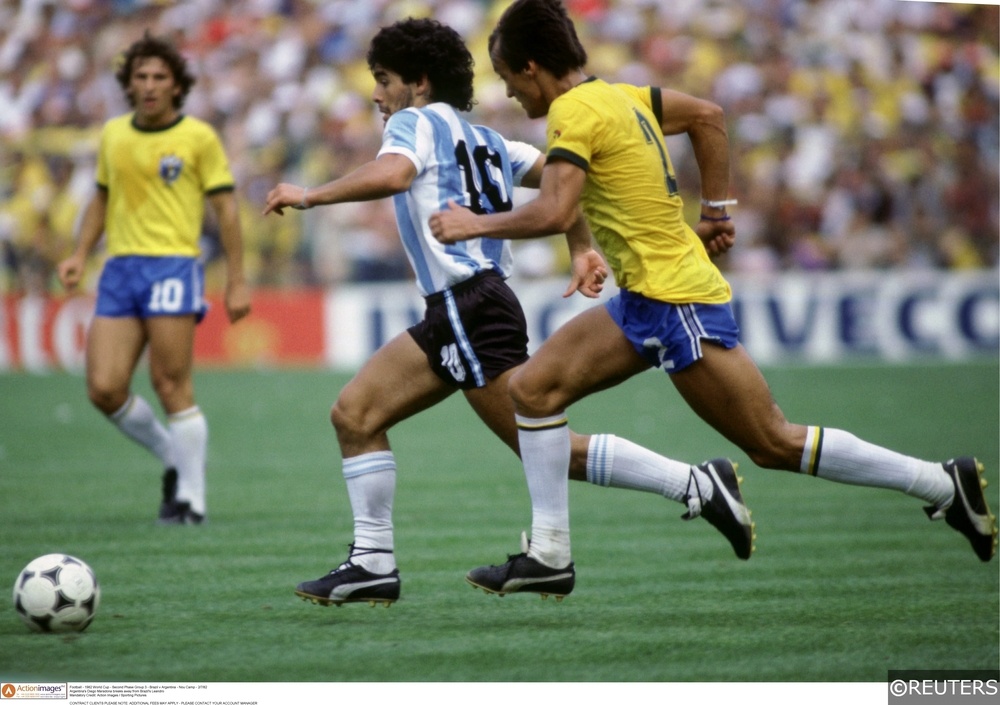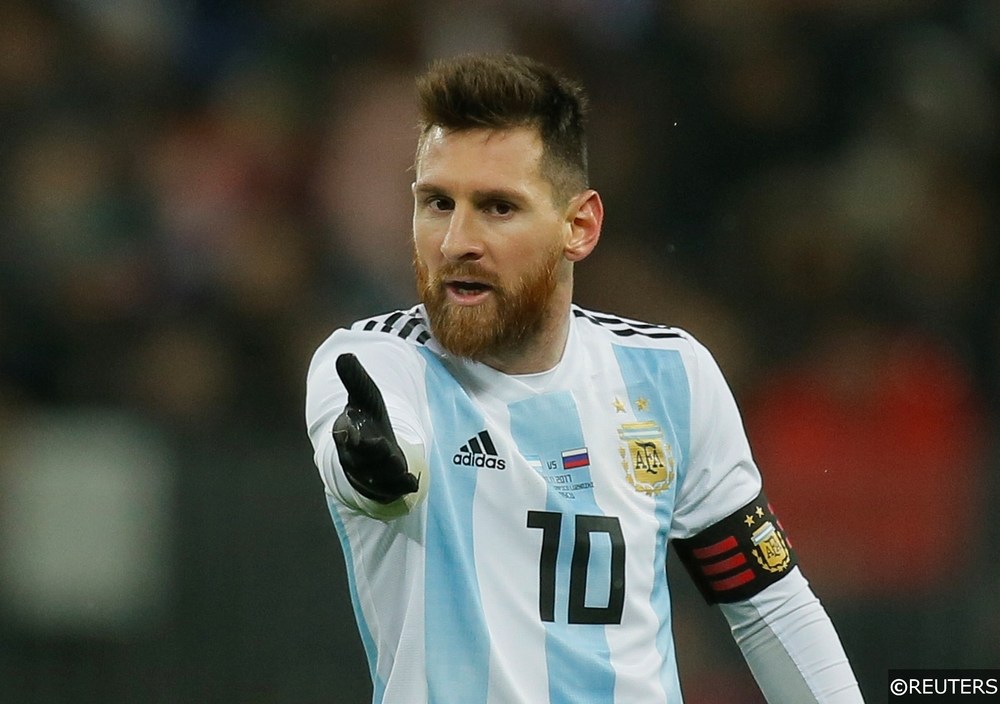
In 1978, in front of a packed Estadio Monumental crowd in Buenos Aires, Argentina claimed their first ever world crown; and what’s more, they’d done it on home soil. At the same time, thousands of the “disappeared” stared into the TV screen; their first glimpse in months of an outside world oblivious to their existence.
Meanwhile, a teenager by the name of Diego Armando Maradona was coming through the ranks at Argentinos Juniors, a modest club from the La Paternal district of the city. A poor boy raised on the outskirts of the capital, Maradona was to become a figure that transcended sport itself; leaving a legacy forever entrenched in Argentina society. A legacy that will never be surpassed.
Be sure to check out our betting blog for more World Cup content!
Rising and Fall of the Junta:
To truly understand what Maradona means to Argentina, you must first understand Argentina itself. Indeed, Maradona’s path towards footballing and social immortality was entwined with an uprising of a nation, freeing itself from a brutal regime that forced a silent darkness that only a short, diminutive number 10 could occasionally light up. When all hope was lost, the boy from the shantytown became every Argentine. Each touch of the ball signifying a new tomorrow and showing that in spite of all obstacles and hardships; there’s always the chance of a brighter future.
The death of much maligned Argentine President Juan Peron in 1974 plunged Argentina into complete crisis as already ongoing guerilla warfare grew more intense amidst worsening social and economic conditions within the country. By 1976, as violence soared to unprecedented levels, a right wing led coup seized power from Peron’s wife, Isabel, and installed a military junta to preside over the nation.
The junta interrupted all television and radio transmissions, advising the population that the country was now under military control, that martial law was in place and that all residents must adhere to the commands of the new regime.
And so began the darkest period of Argentine history. The newly formed dictatorship not only targeted left wing guerrillas, but anyone with suspected left wing views. In fact, anyone who displayed any kind of resistance or criticised the junta’s power was denounced as subversive and joined the list of over 30,000 Argentines who “disappeared” in silence.
By the World Cup in 1978, the “Dirty War” was in full flow and a nation united by such a momentous sporting event muffled the tortured screams of those disappeared in hidden holding centres all over the country. At this point in time, guerrilla activity had all but ceased, but the junta continued its brutal purge of society, looking to eliminate any potential threat to its totalitarian state.
In the early stages of the waves of abductions and killings, most Argentines were unaware of what what was happening in the midst of their communities. Diversions, such as the World Cup, blinded society and the few who were aware remained quiet; knowing the grim fate that would await them if they dared denounce the junta.
If you look back at footage from the final against Holland, you’ll notice black tape wrapped around the goalposts, one of the very earliest protests against the war waged by the government. Leaders were told that the tape was commonly used in Europe for aesthetic purposes, which was of course untrue, but the tape instead allowed a secret message of resistance to be broadcast to the world in recognition of those taken from the streets.
As the years passed and the number of the missing increased, society grew braver and began to fight back, with support of the international community for whom it was now apparent that the government was attacking its own people.
In a last ditch bid to re-affirm public support and control, the junta launched it’s trump card; an effort to seize the Falklands Islands. Argentina’s claim to the islands had always existed to some degree but was never at the forefront of policy, but the junta believed that what they thought would be an easy military victory would restore national pride and belief in their reigme.
Instead the war was to prove the final straw. After invading the island, Argentine forces met British resistance they simply had not anticipated. The junta sent almost anyone they could find to fight, young teenagers without the slightest inkling of military experience. Over 11,000 Argentines were taken prisoners of war and 649 men lost their lives. The junta had sent thousands to be sitting ducks in their name; enough was enough.
In the following months, the junta were forced to loosen their grip over the nation and on December 10th, 1983, Argentina was back in civilian control but was a broken, wounded state; plagued by a government that had brought it to its knees and knocked it further down.
D10S:
Meanwhile, in the midst of the repression, young Diego was making quite the name for himself. After making his debut at Argentinos aged just 15, Maradona dazzled supporters up and down the country, plunging home a stunning 116 goals in 167 appearances. The youngster was everything society was deprived of; he played with a freedom and creativity forbidden in almost every walk of life, but did so in the most Argentine of manners; with swagger and steely determination.
In 1981, Maradona moved to Boca Juniors, one of Argentina’s biggest clubs, if not the biggest. Boca was, and still remains the club of the working class and in Maradona they possessed the very symbol of that class. 40 games and 28 goals later, Maradona lead Boca to the domestic title and was then sold to Barcelona for a world record price prior to the 1982 World Cup.

That tournament hadn’t been a success for Maradona or Argentina’s ageing stars but going into the 1986 tournament, Maradona, now at Napoli, was an established world star and captain of the team.
Argentina remained deeply hurt by the pain that had just been inflicted on it but Maradona was to bring joy no war, government or institution could ever bring. The man who had risen from the very bottom of a broken, attacked society was not just competing in a football tournament, he was bringing an entire nation out of a horrific depression.
Over the following month in Mexico, Maradona was a man possessed. Argentina qualified from the group stage in unbeaten fashion before eliminating Uruguay in the round of 16; moving onto a quarter-final clash with England that would become one of the world’s most famous matches.
For Maradano and Argentina, those 90 minutes were not just a football match. In the words of the man himself looking back on it; “The English came to play for their lives but what they did not take into account was that we came to play for two lives. The government sent such young guys of 17, 18 years old to fight in the Falklands slaughterhouse. And by winning the match we could somehow diminish the pain of so many mothers that lost sons in the war.”
Maradona was simply unstoppable. His famous “hand of god” goal gave Argentina the lead but his second still takes the breath away to this day. A goal that encapsulated Argentina’s struggles and put them directly onto a football pitch; allowing the nation’s prodigal son to dig a hole and bury them.
In 10 seconds of pure genius, Maradona left man after man in his wake with supernatural ability; embellishing the spirit of over 30 million people and closing up each of society’s open wounds as he glided beyond the entire English team with surgical precision.
Beardsley, Reid, Butcher, Fenwick and Shilton could only watch on as Maradona weaved his magic; the boy from the streets overcoming every obstacle thrown at him once again to deliver the final blow and send Argentina into the semi finals. A goal for everyone. A goal that brought happiness that had not been felt in what seemed like eternity.
Both of Maradona’s goals in that game feature in our 5 Famous Argentina goals piece.
Belgium were the opponents in the semi-final; but you could have put all 23 of the competition’s teams onto the pitch that day and Maradona would still have came out victorious. He notched twice and assisted once; one of his strikes yet another display of ability the planet had rarely seen before.
Having carried La Albiceleste to the final; West Germany didn’t allow Maradona an inch in an enthralling final. He was surrounded by multiple Germans at all times and knocked to the ground every time he received the ball. But if the past decade had taught Maradona anything; it was to keep fighting in the face of adversity, to get back on your feet in the hardest of times.
With the scores at 2-2 after blowing a 2-0 lead, Argentina were on the ropes and their dream looked like being shattered. Most of the 115,000 strong crowd were supporting the Germans, who by now had all the momentum.
However, with 6 minutes left to play the ball dropped at the feet of Maradona and with a finesse crafted for years on the roughest of streets, Diego slipped the ball through to Jorge Burruchaga who fired the ball into the net; Argentina were champions.
As Maradona lifted the trophy aloft with a gleaming smile, it pointed towards the heavens above the Estadio Azteca, where the spirit of the disappeared was surely watching down. The win in 1978 is hardly mentioned in Argentina nowadays; so pure was the joy of securing the crown in 1986; when Argentina finally became Argentina again.
Maradona and co restored national pride in its true essence; unforced and erupting from within. Argentines had endured years of suffering, didn’t live the lives of others and still to this day are not fully healed, but on that day, they were kings of the world, lead by the personification of uprising against all odds. For everything they lacked, they had Maradona and the elation that he brought was all that mattered.
Maradona carried a weight few men will ever do and that would eventually catch up with him later in life, plagued by drug issues and voicing questionable opinions to say the very least. Nonetheless, it’s hard to judge a man who walked in the bloodstained shoes Maradona did and he’ll forever be the hero of an entire generation of Argentines; the man who provided a reason to keep going. A man who projected the image of a free Argentina to the universe.
Maradona’s legacy is truly eternal. To many Argentines he’s more than words can describe and that’s why he’s so often pardoned for actions others would be crucified for. The “Iglesia Maradoniana” (Church of Maradona) has gained close to 200,000 members since being formed purely to worship the man in 1998. The now 57 year old was Argentina’s miracle worker and is commonly referred to as D10S (the Spanish word for god mixed with his shirt number.)

Ability wise there’s very little between Maradona and current prodigy Lionel Messi, but the latter will never be able to acclaim the same status as the former. no matter what he achieves on the field. Argentines love Maradona the footballer like nothing else; a national treasure.
Don’t take it the wrong way, Messi is still a man loved back home, but for many he’s a distant figure who plays on television a couple of times a week in a country he’s lived in for over half of his life. Maradona happened; he was real and demonstrated his talent for years on Argentine soil, Messi is a phenomenon Argentine society cannot live in such a personal way.
There is no doubting the current Argentina number 10 loves his nation deeply and he’s demonstrated that on numerous occasions. No matter what happens in Russia, Messi merits the utmost respect and is without a single doubt the better role model of the two off of the pitch.
But to question the morality of Maradona is very difficult. He came from the bottom of the bottom and burdened responsibilities no footballer should ever have. His complex character shaped in the most testing of times; for the man least prepared for tackling them.
We could spend forever and a day discussing Maradona and his personal beliefs, his complexities and abnormalities, as people do on an almost daily basis in Argentina, given his continual dominance of the news.
But on the pitch there’s very little to say; D10S, in more way the one. The executioner of a haunted past and the lease of a new beginning. Eternal.
Follow Free Super Tips on Twitter to stay up to date with our daily tips and predictions or browse more football content on our website:


